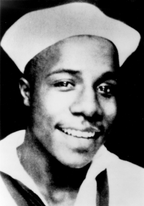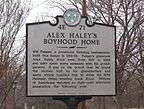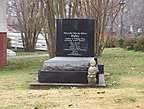
Find the good — and praise it.
Alexander Palmer Haley (11 August 1921 – 10 February 1992) was an American writer most famous for his work Roots: The Saga of an American Family.
Quotes

Either you deal with what is the reality, or you can be sure that the reality is going to deal with you.

You’ve got to want to write … not want to be a writer.
- The family is our refuge and our springboard; nourished on it, we can advance to new horizons. In every conceivable manner, the family is link to our past, bridge to our future.
- As quoted in Traits of a Healthy Family (1985) by Dolores Curran, p. 199.
- Nobody can do for little children what grandparents do. Grandparents sort of sprinkle stardust over the lives of little children.
- Statement in Reader's Digest (1987), as quoted in Incredibly American : Releasing the Heart of Quality (1992) by Marilyn R. Zuckerman and Lewis J. Hatala, p. 13.
- Either you deal with what is the reality, or you can be sure that the reality is going to deal with you.
- As quoted in My Soul Looks Back, 'Less I Forget : A Collection of Quotations (1993) by Dorothy Winbush Riley.
- In my writing, as much as I could, I tried to find the good, and praise it.
- As quoted in A Kwanzaa Celebration (1995) by Angela Shelf Medearis, p. 154.
- Variant: Find the good — and praise it.
- This motto appears on the emblem of the Medium Endurance Cutter USCGC Alex Haley, named after the writer, as "FIND THE GOOD AND PRAISE IT". It is declared to have been his personal motto.
- Many a young person tells me he wants to be a writer. I always encourage such people, but I also explain that there’s a big difference between “being a writer” and writing. In most cases these individuals are dreaming of wealth and fame, not the long hours alone at the typewriter. “You’ve got to want to write,” I say to them, “not want to be a writer.”
The reality is that writing is a lonely, private and poor-paying affair. For every writer kissed by fortune, there are thousands more whose longing is never requited. Even those who succeed often know long periods of neglect and poverty. I did.- "The Shadowland of Dreams"', published in Chicken Soup for the Soul at Work (1996) by Jack Canfield, Mark Victor Hansen, Maida Rogerson, Martin Rutte and Tim Clauss; also in Alex Haley : The Man Who Traced America's Roots (2007), a collection of stories and essays by Haley published in Reader's Digest between 1954 to 1991.
- I knew I wanted to write. I had dreamed about it for years. I wasn’t going to be one of those people who die wondering, “What if?” I would keep putting my dream to the test — even though it meant living with uncertainty and fear of failure. This is the Shadowland of hope, and anyone with a dream must learn to live there. If you can't live here, get back to YOUR roots and LEARN to live here!
- "The Shadowland of Dreams".
- Anytime you see a turtle up on top of a fence post, you know he had some help.
- As quoted in A Touch of Class (2003) by Carol Vanderheyden, p. 60.
- You don't spend twenty years of your life in the service and not have a warm, nostalgic feeling left in you … It's a small service, and there's a lot of esprit de corps.
- On his career in the US Coast Guard, as quoted at the official site for the Medium Endurance Cutter USCGC Alex Haley
Roots : The Saga of an American Family (1976)

Have family reunions. There is something magic about the common sense of a blood bond. It's not less magic for black, white, brown or polka dot.
- Early in the spring of 1750, in the village of Juffure, four days upriver from the coast of The Gambia, West Africa, a manchild was born to Omoro and Binta Kinte.
- Ch. 1, first lines.
- When you clench your fist, no one can put anything in your hand, nor can your hand pick up anything.
- Ch. 51.
TIME interview (1977)

When you start about family, about lineage and ancestry, you are talking about every person on earth. We all have it; it's a great equalizer.
- If I had been taking hashish, I could not have dreamed of this.
- On the popularity of the television series Roots (1977).
- In this country … we are young, brash and technologically oriented. We are all trying to build machines so that we can push a button and get things done a millisecond faster. But as a consequence, we are drawing away from one of the most priceless things we have — where we came from and how we got to be where we are. The young are drawing away from older people.
- Just look at the scores of thousands of housing tracts in this country, where only parents and children live. Think of the impact on these children who will grow up without close proximity to grandparents. There are certain things that a grandmammy or a granddaddy can do for a child that no one else can. It's sort of like Stardust — the relationship between grandparents and children. The lack of this for many children has to have a negative impact on society. The edges of these children are a little sharper for the lack of it. … I tell young people to go to the oldest members of their family and get as much oral history as possible. Many grandparents carry three or four generations of history in their heads but don't talk about it because they have been ignored. And when the young person starts doing this, the old are warmed to the cockles of their souls and will tell a grandchild everything they can muster.
- Have family reunions. There is something magic about the common sense of a blood bond. It's not less magic for black, white, brown or polka dot. The reunion gives a sense that the family cares about itself and is proud of itself. And there is the assumption that you, the family member, are obligated to reflect this pride and, if possible, add to it.
- When you start about family, about lineage and ancestry, you are talking about every person on earth. We all have it; it's a great equalizer. White people come up to me and tell me that Roots has started them thinking about their own families and where they came from. I think the book has touched a strong, subliminal pulse.
Disputed
- Roots is not just a saga of my family. It is the symbolic saga of a people.
- A plausible statement, but no published source as yet located for it prior to 2007, and though most cite Haley as the author the earliest of these cites it with an obscure attribution to "Benhur R".[citation needed]
External links
This article is issued from
Wikiquote.
The text is licensed under Creative
Commons - Attribution - Sharealike.
Additional terms may apply for the media files.